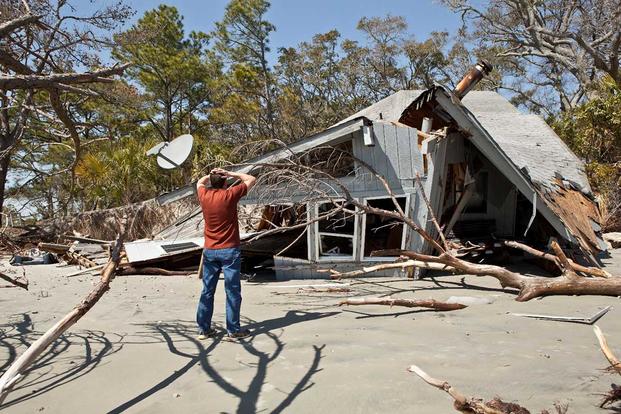If you have a VA loan, the Veterans Administration may be able to help get you and your lender on the same page.
Communities throughout Florida, Georgia, and the Carolinas are still reeling from the effects of Hurricane Matthew, and Veterans living in those areas are no exception.
In fact, each state affected by the recent storms has a higher percentage of Veterans in the population than the US as a whole does, according to the US Census Bureau. Veterans and their communities saw major losses to homes, businesses, and even military bases.
"Hurricane Matthew was pretty intense. Big winds, tons of rain, and it never lets up,” said Erik Anderson, US Army Reserve Veteran and a homeowner in Winter Springs, Florida. “It’s just a big mess, and I have a lot of clean up and repairs to do.”
Over the next few months, many people recovering from the storm’s aftermath could face financial difficulties and could have trouble paying bills on time.
Veterans with loans in process in these areas could also run into trouble. Having a knowledgeable and experienced lender can make all the difference. To learn more about VA home loans with a lender specializing in such loans, Veterans First, click here.
MAJOR INDUSTRY PLAYERS ENCOURAGE LENDERS TO HELP
After the storms passed, the Federal Home Loan Mortgage Corporation Freddie Mac announced that disaster relief policies will be available to homeowners in presidentially declared major disaster areas. Freddie Mac is a government-sponsored secondary lender that buys and services mortgages from primary lenders.
Homeowners could be eligible for:
- Suspended foreclosures with up to 12 months’ forbearance
- Waived penalties and late fees on homes damaged by the disaster
- No credit bureau reporting related to forbearance or delinquencies
Fannie Mae, another major player in the loan industry, issued a similar release. The VA also asks lenders to extend a helping hand in disaster areas.
“The VA encourages servicers of guaranteed loans in disaster areas to extend all possible forbearance to borrowers in distress,” according to VA Guidance on Natural Disasters, a pamphlet issued by the VA.
Most servicers will follow this advice, but it is important to understand that the decision of whether to foreclose is up to the servicer/lender, not the VA.
The VA Helps Lenders and Borrowers Work Together
If you have a VA home loan, you may be able to get some help. The VA has an interest in helping you stay current on payments and avoid foreclosure because it guarantees those loans. Lenders also have an interest in helping you stay on track because foreclosure is expensive and time consuming.
For any financial hardship, including disaster relief, the VA encourages lenders to offer:
- Special forbearances or installment plans
- Additional time to arrange a private sale
- Repayment plans
- Loan modifications
- Short sales
- Deeds in lieu of foreclosure
STEPS TO TAKE IF YOUR HOME WAS HIT
You have the best chances of protecting your assets and getting the help you need by following these steps, recommended by the VA.
As soon as you and your family are out of harm’s way, click here to contact FEMA and begin the disaster application process. Applying before deadlines expire can help you receive the maximum assistance and can help you get in touch with all the agencies involved in disaster relief.
Next, contact your loan servicer about any losses to your home. Your servicer may or may not be your original lender. This is your chance to talk about issues with making payments on time, or about getting a forbearance or loan modification. Your lender can also explain insurance loss checks, repairs, payments to contractors, and more. If you need extra help working with your lender, you can always call a loan specialist with the VA Loan Guaranty Office at 877-827-3702.
Note: If you have a loan in process that wasn’t finalized before the storm, work directly with your loan officer to make sure you get the details right.
Once you have things settled with your servicer, be sure to contact your insurance company. File claims quickly, but don’t feel rushed into a settlement. Have your home inspected for structural damage and start getting estimates from licensed contractors. If you get a check from your insurer for property damage, make sure it’s payable to both you and your loan servicer.
If you are no longer receiving mail at your old address, be sure to notify the US Postal Service and your VA Regional Office.
Groups such as American Legion, Veterans of Foreign Wars, Disabled Americans, and others may offer special assistance—even to non-members.
- Contact FEMA
- Contact Your Loan Servicer
- Contact Your Insurer
- Change Your Address
- Find Additional Assistance
Ready to Get Started?
If you're ready to get started, or just want to get more information on the process, the first step is to get multiple rate quotes with no obligation. You can then discuss qualifications, debt to income ratios, and any other concerns you have about the process with the lenders.




